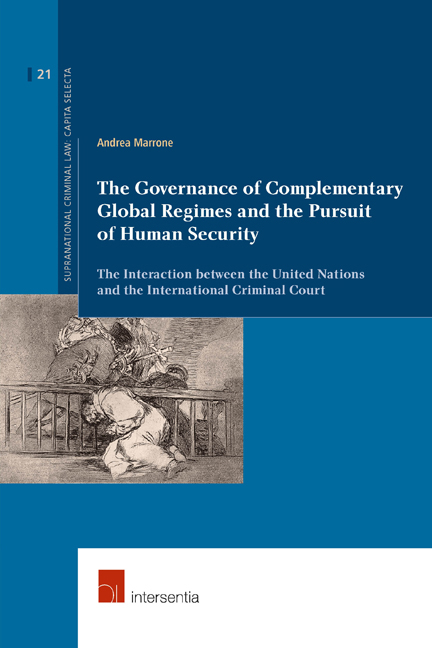 The Governance of Complementary Global Regimes and the Pursuit of Human Security
The Governance of Complementary Global Regimes and the Pursuit of Human Security from PART II - THE GOVERNANCE OF COMPLEMENTARY GLOBAL REGIMES: CHALLENGES, OBSTACLES AND CONCERNS
Published online by Cambridge University Press: 15 December 2017
PRELIMINARY REMARKS
The governance of complementary global regimes dealing with war and crime requires significant efforts from relevant stakeholders, such as States, regional and multilateral organizations and civil society, just to name a few. There are still several obstacles to centralize individuals in situations of war and crime. The accomplishment of sustainable peace in many of them is problematic. The deterrent impact deriving from the fight against impunity is not self-sufficient in such situations. The previous part of this study explored the global values and the requirement of an integrated approach of governance between frameworks fostering human security. Such an approach requires systemic changes at structural, normative and functional levels. The interaction between international governance institutions of complementary character is not configured by primary but only by secondary law. The secondary law regulates the operational activities in the field, or so-called arrangements and agreements, where international governance institutions of complementary nature are both involved. In such context, an integrated approach of governance based on compulsory cooperation is required. These issues will also be extensively discussed in the case studies dealt with in the third part of this study. The purpose of this part is to promote the idea of an effective interaction strategy between complementary global regimes according to the human security doctrine and the rule of law in international relations. Before the recommendations addressed to the decision-makers would take place in the last section of this chapter, the attempt now is to explore the main challenges, obstacles and concerns in the governance of complementary global regimes at structural, normative and functional levels.
This part underscores the fact that the key to solve some of the relevant gaps governing war and crime is seen in the interaction between global regimes of complementary character. Hopefully, political convergence will be found in the immediate, middle and long terms with mandatory cooperation in both referral and non-referral activity coming from the Security Council to the Court. Unfortunately, the transition of governance systems fostering human security is compromised by several factors. The three chapters of this part deal respectively with the challenges in the governance of complementary regimes, the structure and competence of their institutions, and the requirement of political convergence to become complementary in accordance with the constitution of the world community.
To save this book to your Kindle, first ensure [email protected] is added to your Approved Personal Document E-mail List under your Personal Document Settings on the Manage Your Content and Devices page of your Amazon account. Then enter the ‘name’ part of your Kindle email address below. Find out more about saving to your Kindle.
Note you can select to save to either the @free.kindle.com or @kindle.com variations. ‘@free.kindle.com’ emails are free but can only be saved to your device when it is connected to wi-fi. ‘@kindle.com’ emails can be delivered even when you are not connected to wi-fi, but note that service fees apply.
Find out more about the Kindle Personal Document Service.
To save content items to your account, please confirm that you agree to abide by our usage policies. If this is the first time you use this feature, you will be asked to authorise Cambridge Core to connect with your account. Find out more about saving content to Dropbox.
To save content items to your account, please confirm that you agree to abide by our usage policies. If this is the first time you use this feature, you will be asked to authorise Cambridge Core to connect with your account. Find out more about saving content to Google Drive.